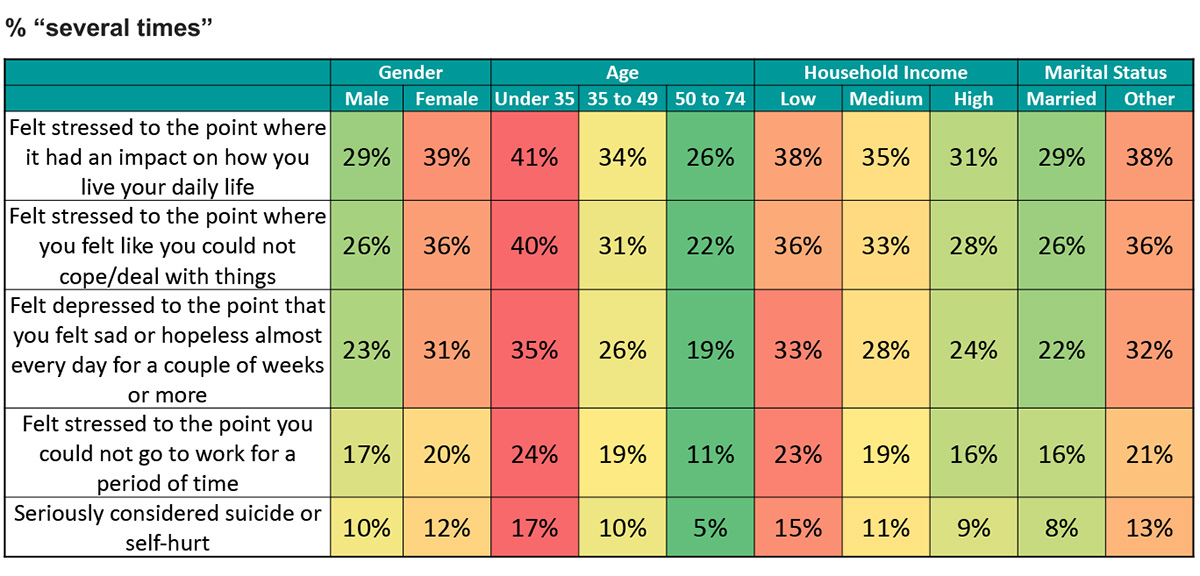Rising importance of mental health in Switzerland
The Ipsos Global Health Service Monitor is an annual study that explores the biggest health challenges facing people today and how well-equipped people think their country’s healthcare services are to tackle them. We ran the survey in 34 countries including Switzerland between 22nd July and 5th August 2022 on Ipsos’ Global Advisor online platform. Attached you find the global report with a focus on Switzerland.
Key findings about Switzerland:
- In Switzerland, but also in other countries, mental health has now overtaken cancer to become the second highest concern globally.
- 32% of Swiss people think that cancer is one of the biggest health problem today.
- Switzerland is one of most concerned countries about stress.
- 74% of Swiss people say that mental health and physical health are equally important
- 45% of Swiss people agree with the sentence "Many people in my country cannot afford good healthcare"
Health Concerns
Coronavirus remains the number one concern for a third year running, mentioned by a global country average of 47%, down 23 percentage points on 2021. Japan is the country which shows the highest level of concern about Covid-19 (at 73%), ahead of Peru (66%) in second.
Mental health has, for the first time, taken the number two spot and now succeeds Cancer when people think about health concerns in their country. Mental health is most prevalent as a concern in Sweden (63%), Chile (62%), and Ireland (58%). It has seen a five-percentage point increase year-on-year since 2020 and currently stands at 36%.
Cancer is still a prominent concern, with just over a third (34%) perceiving it as a top worry. The level of concern in Portugal, at 79%, is well above any other country, and by far the biggest concern in the country. Next is Belgium, in second, where 59% single out cancer as a main healthcare concern.
Switzerland is ranked at the 24th position (total of 34) of countries in which coronavirus is seen as the biggest problem facing people in their country.
Healthcare Perceptions
Though the pandemic still lingers, in most of the countries covered in the survey, more than half rate their healthcare system’s quality as “good”. There are some outliers in Latin America and Central Europe, with Brazil (31%), Mexico (31%), and Peru (35%) describing their healthcare as poor. Similarly, Hungary and Poland stand out, with significant proportions thinking their healthcare service is poor (53% and 43% respectively).
When asked to look into the future, the outlook is not entirely optimistic. A third (33%) think the quality of healthcare in the coming years will improve and 20% see it getting worse. Contrary to their current pessimism, people in Latin America are more optimistic about their future in relation to the rest of the world. Colombia (71%), Brazil (62%), and Peru (59%) all see quality improving. Meanwhile, nearly half (45%) of Hungarians think it will get worse. France (43%) and Great Britain (39%) are also negative in their forecasts.
There is widespread agreement about the pressures on individual countries’ healthcare capacity. Three in five (61%) globally agree their system is overstretched. Newcomer Portugal ranks first at 87%, followed by Great Britain (83%) whose sense of concern has been consistent over the years.
Also a trend in Switzerland: In fact, 20% of Swiss people think that the quality of the healthcare system will get worse.
Healthcare Challenges
In conjunction with this mood that systems are overstretched, we see that access to treatment/waiting times emerge as the main perceived problems their country’s healthcare system faces – selected by a global country average of four in ten. Not enough staff is joint first for the first time since we started asking these questions in 2018. Cost of accessing treatment is the third most selected issue globally (31%). While no country has bureaucracy as their top healthcare challenge, it is widely recognised among the main issues.
Waiting times are a particularly prominent concern in Hungary, Chile, and Portugal (in each country 65% single it out as a challenge). However, this pattern does not follow when we look at where not having enough staff is a particular challenge. Here Sweden (76%), France (69%), and Netherlands (67%) as the top countries.
Although slightly further down the list, bureaucracy is still a challenge for a quarter of respondents (25%). Argentina has it as their joint second highest challenge at 43%, only just behind lack of investment (44%). Other LATAM countries struggling are Mexico (41%) and Peru (39%).
Outside the top issues, we see that lack of investment in preventative health (22%) and lack of investment (20%) in general rank next highest. Ageing population is seen as a challenge in some of the Asian countries: Japan (52%), South Korea (51%), and China (46%).
Focus on Switzerland:
- The biggest problem facing the healthcare system in Switzerland according swiss people is the lack of staff (53%).
- Only 34% of Swiss people think that waiting times to get an appointment with doctors are too long in Switzerland. Which is the lowest share compared to all measured countries.
- Swiss healthcare system is perceived as unequal by 1/3 of the population.
Thinking About Our Mental & Physical Wellbeing
On a global country average, 58% of those surveyed think about their mental wellbeing either very or fairly often, this is five percentage points higher compared to 2021. Physical wellbeing on the other hand is 12 points higher on average at 70%.
The proportion thinking about their mental wellbeing “often” show some differences by country, with Portugal (82%) ranking the top, followed by Brazil (76%) and South Africa (75%), down to 33% in China.
Demographic analysis shows that the people most likely to think about their mental health ‘very often’ are the under 35s (31% versus 16% of over 50s) and women (27% versus 21% of men). This pattern is also seen with physical health.
Focus on Switzerland:
- 48% of Swiss people see mental health as one of the biggest health problems facing people in their country
- 49% of Swiss people think often about their mental wellbeing
Mental vs Physical Health – Which Takes Priority?
The perceived importance of mental and physical wellbeing seems to cross borders, with nearly 8 in 10 on a global country average ranking them both equal (76%). Out of the 34 countries surveyed, 30 have over 7 in 10 saying mental and physical wellbeing are equally important. There are only four countries that are exceptions, two of which still have it at over half: Thailand (66%), Saudi Arabia (54%), India (49%), and the UAE (48%). However, Saudi Arabia, India, and the UAE have the highest proportion of people saying mental health is more important than physical health.
Focus on Switzerland:
- 74% of the people in Switzerland say that mental health and physical health are equally important.
Health Services Perceived vs Experienced
So, the public believe that mental and physical wellbeing are equally as important. But do people’s healthcare systems reflect this view and provide equal treatment? On a global country average, a third (33%) believe that both are treated equally. Only 12% on average think mental health is given more priority; this contrasts with 41% saying their healthcare system focuses more on physical health.
MAPThe country with the biggest perceived imbalance by a significant amount is Portugal (73% saying physical is given more importance than mental health), with Sweden next at nearly three-fifths (58%). The countries with the highest perception of mental health being treated with more importance than physical health are also the same countries that have highest proportion saying mental health should have more priority than physical health: India (27%), Saudi Arabia (25%), and the UAE (24%).
The country with the biggest perceived imbalance by a significant amount is Portugal (73% saying physical is given more importance than mental health), with Sweden next at nearly three-fifths (58%). The countries with the highest perception of mental health being treated with more importance than physical health are also the same countries that have highest proportion saying mental health should have more priority than physical health: India (27%), Saudi Arabia (25%), and the UAE (24%).
Experiences Over the Last Year
The effects of stress on daily life are the most frequently reported mental health issues globally, with 63% saying they have felt (at least once) stressed to the point where it had an impact on how they live their daily lives over the last year. Stress has also made three-fifths (59%) feel like they can’t cope with things and two-fifths (39%) feel they can’t go to work at least once. A quarter say they considered suicide or self-harm once in the last year.
These issues are most pertinent among people under 35, women, unmarried people, and low-income households.

Focus on Switzerland:
- 38% of Swiss people think that mental health and physical health are treated equally important in Switzerland, whereas 40% think that physical health is given a higher priority at the Swiss health care system.
About the Study
These are the results of a 34-market survey including Switzerland conducted by Ipsos on its Global Advisor online platform. Ipsos interviewed a total of 23,507 adults aged 18-74 in the United States, Canada, Malaysia, South Africa, and Turkey, 20-74 in Thailand, 21-74 in Indonesia, and 16-74 in 27 other markets between Friday, July 22 and Friday, August 5, 2022.



